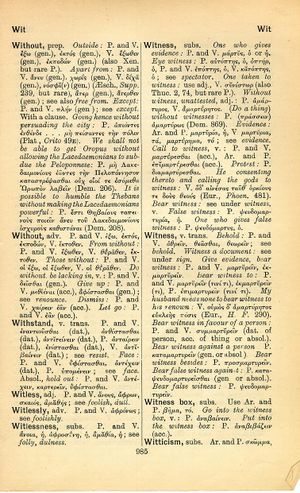without
Θεὸς συνεργὸς πάντα ποιεῖ ῥᾳδίως → Rem facile quamvis peragit adiutor deus → Wirkt Gott als unser Partner, macht er alles leicht
English > Greek (Woodhouse)
preposition
outside: P. and V. ἔξω (gen.), ἐκτός (gen.), V. ἔξωθεν (gen.). ἐκποδών (gen.) (also Xen. but rare P.).
apart from: P. and V. ἄνευ (gen.), χωρίς (gen.), V. δίχα (gen.), νόσφι(ν) (gen.) (Aesch., Supplices 239, but rare), ἄτερ (gen.), ἄτερθεν (gen.); see also free from.
except: P. and V. πλήν (gen.); see except.
With a clause. going hence without persuading the city: P. ἀπιόντες ἐνθένδε… μὴ πείσανπες τὴν πόλιν (Plato, crito 49E).
we shall not be able to get Oropus without allowing the Lacedaemonians to subdue the Peloponnese: P. μὴ Λακεδαιμονίους ἐῶντες τὴν Πελοπόννησον καταστρέψασθαι οὐχ οἷοί τε ἐσόμεθα Ὠρωπὸν λαβεῖν (Dem. 206).
it is possible to humble the Thebans without making the Lacedaemonians powerful: P. ἔστι Θηβαίους ταπεινοὺς ποιεῖν ἄνευ τοῦ Λακεδαιμονίους ἰσχυροὺς καθιστάναι (Dem. 208).
adverb
P. and V. ἔξω, ἐκτός, ἐκποδών, V. ἔκτοθεν.
from without: P. and V. ἔξωθεν, V. θύραθεν, ἔκτοθεν.
those without: P. and V. οἱ ἔξω, οἱ ἔξωθεν, V. οἱ θύραθεν.
do without be lacking in, v.: P. and V. δεῖσθαι (gen.).
give up: P. and V. μεθιέναι (acc.), ἀφίστασθαι (gen.); see renounce.
dismiss: P. and V. χαίρω ἐᾶν, χαίρειν ἐᾶν (acc.).

